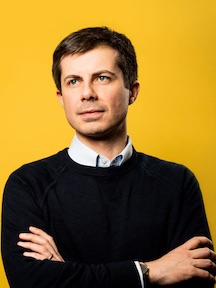By Jacob Gambrell
At only 37 years old, ΦBK member Pete Buttigieg has made history as the first openly gay person to run for President of the United States. His historic campaign for the Democratic Party’s nomination is a huge victory for the LGBTQ community. In addition to his personal identity, his campaign is also different in how his emphasis of philosophy over policy and his wide-ranging interests embody the liberal arts.
Pete Buttigieg grew up in South Bend, Indiana, and has been its mayor since 2012. After high school, he attended Harvard University where he studied history and literature. He became a member of Phi Beta Kappa in 2004 and was named a Rhodes scholar later that year. If elected, he would be the 18th Phi Beta Kappa member to serve as the President of the United States. In Oxford he studied philosophy, politics, and economics. While politics and economics are traditional fields for someone interested in pursuing a career in politics, philosophy is not. This education in philosophy influences his campaign in a way that differentiates himself from many of the other candidates in the crowded Democratic primary.
Perhaps inspired by the meaning of “Phi Beta Kappa” that “Philosophy is the governor of one’s life” he believes that Democrats should focus on their overarching philosophy instead of wonkishly focusing on the minutia of policies and platforms. After establishing that philosophy, the policies will logically flow out from that. In an interview with VICE he said, “Part of where the left and the center-left have gone wrong is that we’ve been so policy-led that we haven’t been as philosophical. We like to think of ourselves as the intellectual ones. But the truth is that the right has done a better job, in my lifetime, of connecting up its philosophy and its values to its politics. Right now I think we need to articulate the values, lay out our philosophical commitments and then develop policies off of that.”
While Buttigieg has been criticized for lacking clear policy goals and being too vague and ambiguous, this strategy seems to be working. While lacking the name recognition and political experience of many of the other candidates, he has placed third in a poll of likely Iowan voters and consistently places in the top five with 6-9% of the support of polled voters. He has also fundraised over $7 million in the past several months since he first launched his campaign. It is clear that voters are resonating with his over-arching philosophy.
In addition to emphasizing the importance of philosophy, Buttigieg brings his wide-ranging interests into his campaign. He grew up in an academic household where both of his parents were professors at the University of Notre Dame. His mother, Jennifer Anne Montgomery, was an English linguist. His father, Joseph Buttigieg, was a literary scholar and translator. Probably influenced by his mother’s love of language, Pete Buttigieg is a polyglot. He has spoken both French and Norwegian to international journalists on the campaign trail, and his campaign has confirmed that he can speak eight languages in total: English, Norwegian, Spanish, French, Italian, Maltese, Arabic, and Dari. Learning this many languages does not give a strategic benefit for a campaign for the presidency but the inherent value of knowing another language. For example, he learned Norwegian because he wanted to read more novels by Erlend Loe in the original Norwegian language.
Not only does Buttigieg love of learning languages, he also loves literature. Perhaps this comes from his father. He frequently speaks about his favorite books on the campaign trail. He especially likes to bring up his favorite book, James Joyce’s Ulysses, recently saying that “Its doing the same thing in literature that I’m trying to do in politics.”
Like his emphasis in on philosophy, his love of literature and languages embody the ideals of a liberal arts education. While his background in history, politics, and economics are very important for a career in politics, these other interests help to provide new perspectives and insights. We tend to view education as nothing more than “job training.” There in an inherent goodness to education, even if it does not directly relate to your career. Mayor Buttigieg embodies that liberal arts education as his historic campaign emphasizes the importance of philosophy in addition to politics and economics.
Jacob Gambrell is a senior at the University of Mississippi majoring in international studies and Spanish. He was inducted into Phi Kappa Beta there in 2018. The University of Mississippi is home to the Beta of Mississippi chapter of Phi Beta Kappa.




